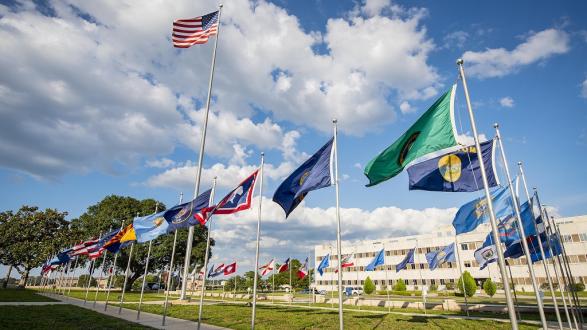In:
In a recent teleconference, DJ Peterson, a Pacific Council member and president of Longview Global Advisors, moderated a discussion on the challenges facing the United States on the international stage this year. The teleconference featured Frances Z. Brown, fellow of the Democracy, Conflict, and Governance Program at the Carnegie Endowment for International Peace; Andrew Selee, president of the Migration Policy Institute; and Lindsey Ford, David M. Rubenstein Fellow of the Foreign Policy Program and Center for East Asia Policy Studies at the Brookings Institution.
Here are key takeaways from the call, with the full audio recording below.
- Brown said it is time for the United States to dial back its engagement in the Middle East. “Since the killing of Soleimani, we’ve had to send more troops to the region, embassies are on high alert, and we see ISIS poised to gain. We might also be forced to leave Iraq, which would be destabilizing.”
- Ford said she sees a clear erosion of trust in U.S. leadership around the world. “Pulling out of Syria, Trump’s approach to trade negotiations, pulling out of the Iran deal, and other examples leave other countries to believe that the United States won’t stand by its word. There is a lot of anxiety from other countries, including U.S. allies, about the Trump administration’s approach to Iran and North Korea, which are looking increasingly hostile. I’m worried how that will play out in 2020.
- Peterson pointed out that while the Trump administration likes to tout the strength of the U.S. military, what actually drives the United States’ international relations is trust.
- Selee argued that the Trump administration’s changes to U.S. immigration and refugee policy will be a campaign issue in the 2020 presidential election. “People continue to aspire to be American. U.S. soft power is still powerful. But there is a growing skepticism.” However, he said it is unlikely that major immigration reform will be enacted in 2020 because it’s an election year. “But we could see movement regarding DACA. Democrats have shown a willingness in the past to provide some border wall funding in exchange for protections for the Dreamers.”
- “The Trump administration still has some tools to achieve their objectives in the Middle East, but they need to reinstate the regular national security decision making processes,” Brown said. “That includes fully vetting all options and contingency plans. U.S. diplomats need to lead U.S. foreign policy. The U.S. military will always be strong, but we’ve seen a hollowing out of the State Department in the last three years. We also need a proper return to U.S. intelligence.”
- Ford said it is a welcome change that “there is a growing interest from Congress to step into a bigger role in foreign policy than they have in the past. That is the way it should be. They should shape trade deals, budgets, and war.”
- Peterson argued that the economy doesn’t seem to have been affected by the recent international flare-ups. “At the height of the U.S.-Iran crisis, the markets shrugged it off.”
- “Even those who like Trump in the Middle East have seen this increased volatility in the region as negative,” Brown said. “The Gulf states do not want a hot war with Iran either.”
- Ford said the world will not be forgiving if Trump is reelected in 2020. “If Trump is reelected in 2020, the world will not view that as an accident. It will say something more profound about where the United States is heading as a country. Countries will form more multilateral coalitions without the United States. I’m most concerned about the future of NATO."
- “We often forget Africa when we talk about big power politics, but it’s important to remember that where a lot of those competitions are playing out are in Africa,” Brown said.
- “The Venezuela crisis will soon be the size of the Syria crisis,” Selee said. “We need to keep an eye on that and learn what Latin American and Caribbean countries like Colombia, Peru, and Brazil have done well.”
- “Cooperation between Russia and China can throw a lot of roadblocks in the United States’ way this year,” Ford said. “There hasn’t been a lot of attention on how they’re coordinating. We need to pay attention.”
Listen to the full conversation below:
_______________________
Justin Chapman is the Communications Officer at the Pacific Council on International Policy.
The views and opinions expressed here are those of the speakers and do not necessarily reflect the official policy or position of the Pacific Council.




